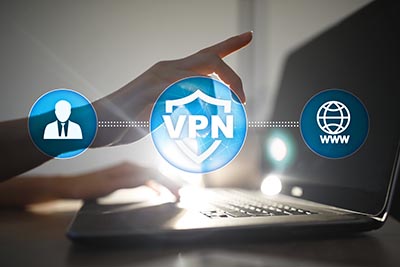
Security is a big deal. And, unfortunately, even a big company like Google isn’t perfect. In fact, the issues with Google’s browser, Chrome, has its own host of security and privacy concerns. That means, to stay safe online, you need a VPN for Chrome, and here’s why.
How security problems happen
Let’s talk about what gets exposed and threatened on Google Chrome. Everyone is different, and every situation is different. You may never be exposed to the same problem as someone else. But not every situation is unique, and it’s likely that hundreds of thousands of others are faced with the same problem as well.
Even the most secure browser is susceptible to issues. Without a VPN for Chrome, who knows what could happen. Take, for instance, software updates. They’re meant to improve these types of security problems, but problems happen at launch.
“Zero-day” exploits happen when a new patch or update is launched. It’s easier for hackers to exploit issues early on as soon as vulnerabilities are exposed. Issues also happen if you don’t keep up with updates. If you aren’t up-to-date you aren’t protected, and hackers will take advantage of it.
There’s really no telling when or how a vulnerability or attack will happen. It’s better to be prepared with a VPN for Chrome than be sorry when it happens.
Recent exploits and attacks
But you need more proof. It’s one thing to say that these security issues happen, and another to see just how often they do occur.
In March 2022, Google issued an emergency security update for all Chrome users. Why the emergency status? Attackers immediately exploited a severe and dangerous zero-day vulnerability. Surprisingly, this update only addresses this single vulnerability. So, it’s an extremely serious issue.
There are 4 very concerning things about this exploitation:
- It affected 3.2 billion users. Yes, billion. This extraordinarily dangerous problem isn’t an outlier.
- No one knows what this problem means for users and how it affects them. Not only does this impact billions of users, but they also won’t say how it impacts them. All that is known is that it is a “Type Confusion in V8,” referring to the JavaScript engine employed by Chrome. Google doesn’t explain technical details until the update effectively protects most users, and it’s common for other cases as well. While this helps protect users from more hackers taking advantage of the fault, it doesn’t help users take the necessary steps to protect themselves. It’s more of a PR thing than a matter of protection.
- The update for one single issue is uncommon. In this case, Google made the right move in putting out an update as soon as possible. But, fixing these issues right away isn’t standard practice. More often, they will wait to put out an update that addresses multiple exploits and other issues. This case is only an exception because it is just that dangerous and affects so many users. In another case, you may be one of the unlucky users to be affected by a security issue, not know about it, and have to wait too long for Google to fix it.
- Knowing what little information about this exploit that we do, we know that it is due to the JavaScript engine employed by Chrome. This means that this problem is not directly under Google’s control. While this may seem like a good thing, it means that Google has little control over what exploits crop up, and from what company. This isn’t uncommon, but it’s a concern to protect yourself from, nonetheless.
Privacy problems
Of course, security problems aren’t the only concern. If you know Google, you know privacy isn’t a big deal to them. In fact, if you haven’t tweaked your privacy settings, chances are Google is tracking you right now. Follow these steps to check:
- Go to your Google profile
- Go to the “Data & Privacy” tab
- Find the section called “Things you’ve done and places you’ve been.”
- Under “Ad settings,” select Ad personalization.
- You should see a list called “How your ads are personalized.”
If personalized ads are turned on, you should see a surprisingly and scarily long list of interests and characteristics they’ve determined work to personalize your ads. It includes things like visited websites, your location, the types of shows you like, and much more. Make sure you turn it off!
Once it’s shut off, you think you’d be hidden, right? Nope. Once you’ve turned off personalization, Google will no longer use your info to personalize your ads. But ads can still be targeted with info like your location or the content of the website you’re visiting. Even choosing to shut off settings like this isn’t enough.
How a VPN for Chrome can help
With all these security and privacy concerns in mind, what do you do? You may have picked up on the fact that a VPN for Chrome is a great solution. How? When you login to your VPN for Chrome, Chrome and anyone else who tries to get your information is blocked from seeing your IP address and location.
Your VPN for Chrome will connect you to a secure server somewhere in the world. Even your internet service provider (ISP) is unable to view your browsing history, let alone hackers. Of course, not all zero-day problems and other Google updates are saved with a VPN for Chrome, but it is the extra layer of protection you need to steer away hackers. Your VPN for Chrome also prevents Google from tracking you for advertising.
Don’t forget personal measures to take as well—without smart internet practices, your VPN for Chrome can protect you, but not as well as it could. Make strong passwords, and don’t repeat them between logins. Tweak your personalization settings, like deleting your search history, ad personalization, and more. Then, for the things you can’t control, count on your VPN for Chrome. If you choose a good one, you’re set for internet freedom and security more than you’d imagine.
Story by Timothy Foster










